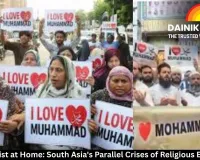"No Kings" in America: The Unprecedented Protests and a Nation's Democratic Anxiety
Digital Desk

With over 7 million marching across the U.S. in "No Kings" protests, the nation is witnessing historic civic mobilization. This opinion explores the profound democratic anxieties driving people to the streets.
On October 18, 2025, the United States witnessed a historic and unmistakable message from its people: over seven million Americans marched in more than 2,700 protests across all 50 states under the banner "No Kings" . This unprecedented mobilization, the largest single-day demonstration in American history, is a profound symptom of a deep-seated national anxiety about the health of its democracy.
The protests were a direct response to perceptions of authoritarian overreach by President Donald Trump during his second term. Organizers, a coalition of over 200 progressive groups, pointed to increased federal crackdowns on free speech, the militarization of cities, and perceived threats to democratic institutions as the catalysts for the movement . The very name "No Kings" evokes the foundational American spirit of rejecting monarchical power, framing the current political moment as a fundamental battle for the republic's soul.
The scale of the protests is a clear indicator that this discontent is not confined to the political fringe. The fact that demonstrations erupted not only in liberal coastal cities but also in smaller towns across the country suggests a widespread and palpable concern about the concentration of executive power. The polarized public reaction—with supporters hailing it as vital democratic expression and opponents dismissing it as radical—only underscores the deep political divisions the protests seek to address .
The "No Kings" protests are more than a single day of action; they are a watershed moment for civic engagement in America. While the immediate policy impact remains to be seen, the sheer number of citizens willing to take to the streets signals a public that is highly alert and resistant to any perceived erosion of democratic norms. This movement sets a new precedent for mass mobilization and will likely serve as a powerful touchstone for ongoing struggles over the balance of power and the meaning of accountability in American government.
I hope these opinion articles provide a strong perspective on the pressing crises of this moment. If you wish to explore the specifics of any one of these issues in greater depth, please feel free to ask.



.jpg)







